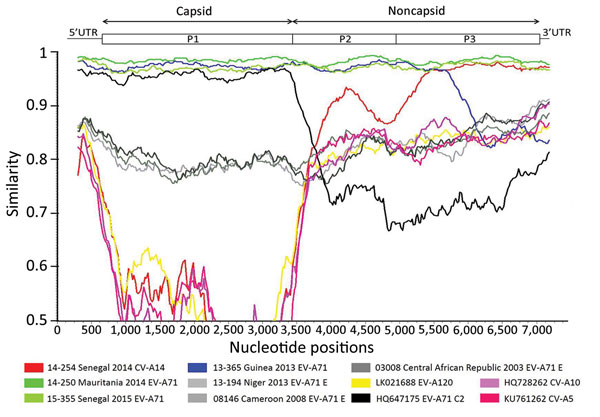Genetic Characterization of Enterovirus A71 Circulating in Africa
Maria Dolores Fernandez-Garcia
1
, Romain Volle
1, Marie-Line Joffret, Serge Alain Sadeuh-Mba, Ionela Gouandjika-Vasilache, Ousmane Kebe, Michael R. Wiley, Manasi Majumdar, Etienne Simon-Loriere, Anavaj Sakuntabhai, Gustavo Palacios, Javier Martin, Francis Delpeyroux, Kader Ndiaye
2, and Maël Bessaud
2
Author affiliations: Institut Pasteur, Dakar, Senegal (M.D. Fernandez-Garcia, O. Kebe, K. Ndiaye); Institut Pasteur, Paris, France (R. Volle, M.-L. Joffret, E. Simon-Loriere, A. Sakuntabhai, F. Delpeyroux, M. Bessaud); Institut National de la Santé et de la Recherche Médicale, U994, Paris (R. Volle, M.-L. Joffret, F. Delpeyroux); Centre Pasteur, Yaoundé, Cameroon (S.A. Sadeuh-Mba); Institut Pasteur, Bangui, Central African Republic (I. Gouandjika-Vasilache); University of Nebraska Medical Center, Omaha, Nebraska, USA (M.R. Wiley); US Army Medical Research Institute of Infectious Diseases, Frederick, Maryland, USA (M.R. Wiley, G. Palacios); National Institute for Biological Standards and Control, Hertfordshire, UK (M. Majumdar, J. Martin)
Main Article
Figure 2

Figure 2. Identification of recombinant sequences in the genome of EV-A71 C2 isolates from patients with acute flaccid paralysis in Africa (14-157, 14-250, 13-365, 15-355) by similarity plot against potential parent genomes (CV-A14 strain 14-254; EV-A71 genogroup E strains 13-194, 08-146, and 03-008) and from GenBank (CV-A10, CV-A5, EV-A120). Similarity plot analysis was performed using SimPlot version 3.5.1 (http://sray.med.som.jhmi.edu/SCRoftware/simplot) on the basis of full-length genomes. For the analysis, we used a window of 600 nt moving in 20-nt steps. Approximate nt positions in the enterovirus genome are indicated. The enterovirus genetic map is shown in the top panel. We used the genome of EV-A71 study strain 14-157 as a query sequence. UTR, untranslated region.
Main Article
Page created: March 19, 2018
Page updated: March 19, 2018
Page reviewed: March 19, 2018
The conclusions, findings, and opinions expressed by authors contributing to this journal do not necessarily reflect the official position of the U.S. Department of Health and Human Services, the Public Health Service, the Centers for Disease Control and Prevention, or the authors' affiliated institutions. Use of trade names is for identification only and does not imply endorsement by any of the groups named above.
